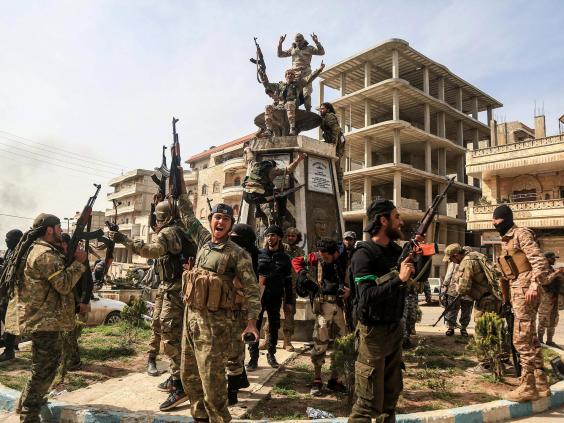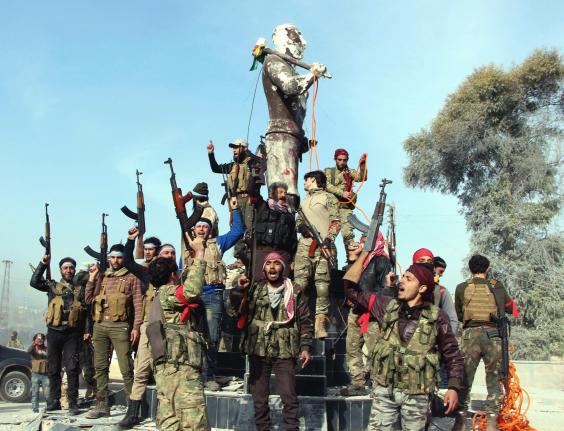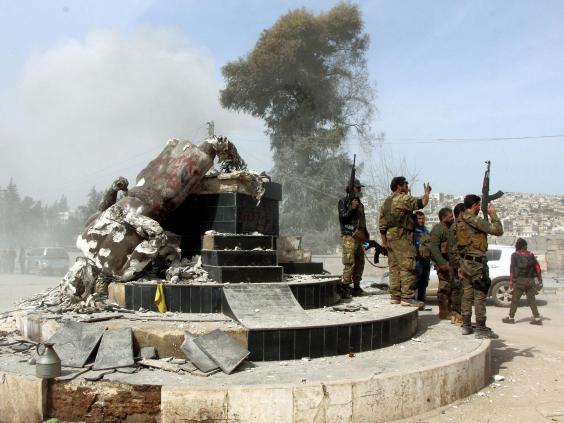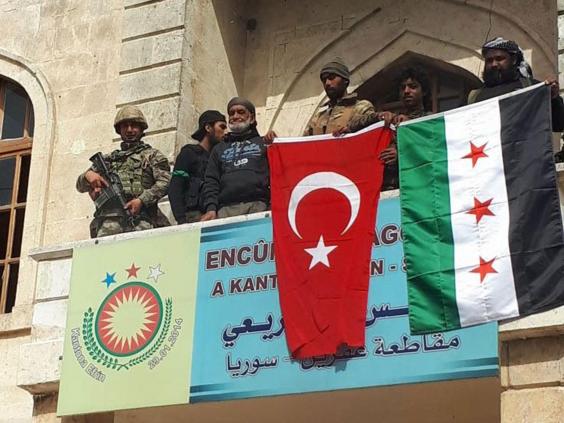Turkish forces and their Syrian rebel allies have raised their flags in the town centre of Afrin and declared full control after a two-month campaign to drive out Kurdish forces.
Images showed Syrian fighters tearing down a statue of Kawa, a mythological Kurdish hero who defeated a brutal ruler and lit fires to spread the news, ushering in spring.
The statue symbolised the Kurdish new year celebrations that are being held this week
A WhatsApp group run by the Kurdish-dominated Syrian Democratic Forces called the act a “blatant violation of Kurdish people’s culture and history”.
Turkey’s President said allied Syrian forces had taken “total” control of the town, which was previously controlled by the Kurdish militia known as the People’s Defence Units or YPG.
“Many of the terrorists had turned tail and run away already,” Recep Tayyip Erdogan told a rally commemorating the First World War Gallipoli campaign.
“Our special forces and members of the Free Syrian Army are cleaning the remains and the traps they left behind. In the centre of Afrin, symbols of trust and stability are waving instead of rags of terrorists.”
A spokesman for the rebel fighters told Reuters they entered Afrin before dawn, meeting no resistance. The Syrian Observatory for Human Rights, a Britain-based war monitor, said pockets of YPG fighters were defying orders to withdraw, but Turkish forces were in control.
Turkey considers the Kurdish forces along its border to be terrorists linked to the outlawed Kurdistan Workers’ Party or PKK, which has waged an insurgency within Turkey for more than three decades.
The fight for Afrin, a once stable pocket of northwest Syria, has opened a new front in Syria’s multi-sided civil war and highlighted the ever greater role of foreign powers in the seven-year-old conflict.
At least 46 Turkish soldiers were killed since Operation Olive Branch began on 20 January.
Nearly 200,000 people have fled the Afrin region in recent days amid heavy air strikes, entering Syrian government-held territory nearby, the Syrian Observatory said.
Turkey pressed on with its campaign despite a UN Security Council call for a 30-day ceasefire across Syria. Ankara said the demand did not apply to Afrin, but its operation has faced criticism in the West.
A Kurdish official, Hadia Yousef, told the Associated Press the YPG fighters have not fled the town, but have evacuated the remaining civilians because of “massacres”. She said clashes in the town were still underway.
Turkey’s armed forces said in a statement that troops were combing the streets for mines and improvised explosive devices.
The army posted a video on social media showing a soldier holding a Turkish flag and a man waving the Syrian opposition flag on the balcony of the district parliament building with a tank stationed on the street.
The soldier called the capture a “gift” to the Turkish nation and to fallen soldiers on the anniversary of a famous First World War victory.
Other footage showed Syrian fighters shooting in the air in celebration while shouting “Allahu akbar”, Arabic for “God is [the] greatest.”
Turkey has threatened to extend its offensive to another Kurdish-controlled region further east, where US forces are stationed alongside the YPG, Washington’s ally against Isis in Syria.
The YPG seized large areas across northern and eastern Syria from the extremist group with the help of coalition air strikes.
Mr Erdogan has repeatedly said that Nato ally Turkey will not allow a “terror corridor” along its border.
Turkey also fears the establishment of a Kurdish self-ruled zone in Syria that could inspire its own Kurdish minority to press for greater autonomy. The Kurds are the largest stateless ethnic group in the Middle East, with some 30 million living in an area split between Iran, Iraq, Turkey and Syria.
It comes after the Kurdish militia and the Syrian Observatory said Kurdish jets struck Afrin’s main hospital on Friday, killing more than a dozen people.
The Turkish military denied the allegations.
Additional reporting by agencies











